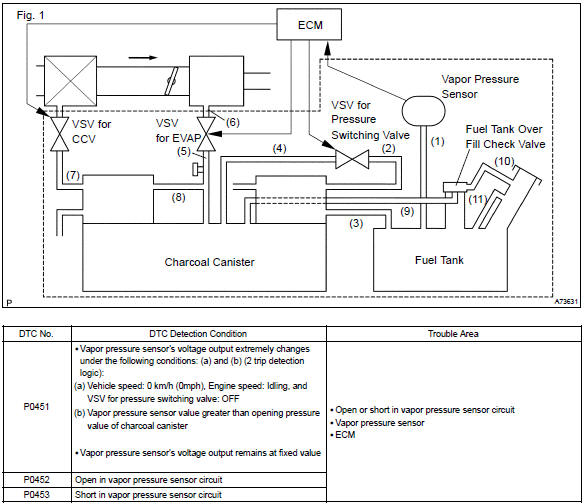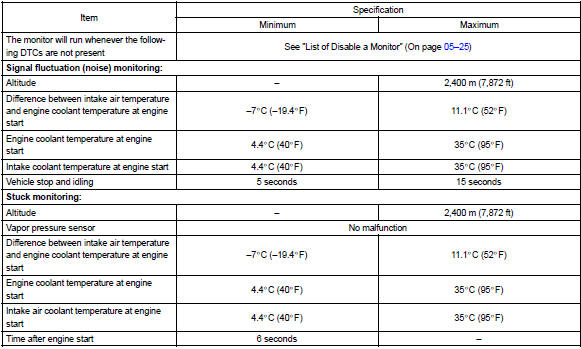Toyota Corolla (E120) 2002ÔÇô2008 Repair Manual / Diagnostics / Sfi system / Evaporative emission control
system pressure sensor / Monitor description
Toyota Corolla (E120): Monitor description
Dtc p0451, p0452 or p0453 is recorded by the ecm when the vapor pressure sensor malfunctions.
P0451
The ecm senses pressure in the fuel tank using the vapor pressure sensor. The ecm supplies the sensor with a regulated 5 v referenceÔÇôvoltage and the sensor returns a signal voltage between 0.5 V and 4.5 V according to the pressure level in the fuel tank.
When the pressure in the fuel tank is low, the output voltage of the vapor pressure sensor is low. When it is high, the output voltage is high.
For this dtc p0451, the ecm checks for a ÔÇŁnoisyÔÇŁ sensor or a ÔÇŁstuckÔÇŁ sensor.
The ecm checks for the ÔÇŁnoisyÔÇŁ sensor by monitoring the fuel tank pressures when the vehicle is stationary and there should be little variation in the tank pressure. If the indicated pressure varies beyond specified limits, the ecm will illuminate the mil and a dtc is set.
The ecm checks for the ÔÇŁstuckÔÇŁ sensor by monitoring the fuel tank pressure for an extended time period.
If the indicated pressure does not change over this period, the ecm will conclude that the fuel tank pressure sensor is malfunctioning. The ecm will illuminate the mil and a dtc is set.
P0452 and p0453
The ecm senses pressure in the fuel tank using the vapor pressure sensor. The ecm supplies the sensor with a regulated 5 v referenceÔÇôvoltage and the sensor returns a signal voltage between 0.5 V and 4.5 V according to the pressure level in the fuel tank.
When the pressure in the fuel tank is low, the output voltage of the vapor pressure sensor is low. When it is high, the output voltage is high.
If the output voltage of the vapor pressure sensor is out of the normal range, the ecm will determine that there is a malfunction in the sensor or sensor circuit.
When pressure indicated by the vapor pressure sensor deviates below ÔÇô3.999 Kpa (ÔÇô30 mmhg) or above 1.999 Kpa (15 mmhg), the ecm interprets this as a malfunction in the vapor pressure sensor. The ecm will turn on the mil and a dtc will be set.

Monitor strategy
P0451

P0452 and p0453

Typical enabling conditions
P0451

P0452 and p0453

Typical malfunction thresholds
P0451

P0452 and p0453

Wiring diagram
Refer to dtc no. P0441
Other materials:
Inspection procedure
1 Check side squib(lh) circuit(airbag sensor assy center ÔÇô front
seat airbag assy lh)
Disconnect the negative (ÔÇô) terminal cable from the battery,
and wait at least for 90 seconds.
disconnect the connectors between the airbag sensor
assy center and the front seat airbag assy ...
Using the steering wheel switches
The steering wheel switches can be used to operate a connected cellular phone.
Operating a telephone using the steering wheel switches
■ Steering wheel switches on the right hand side
1 Off hook switch
ÔÇó Make a call
ÔÇó Receive a call
ÔÇó Display ÔÇťPhoneÔÇŁ screen
2 On hook switch
Ô ...
Power windows
Opening and closing the
power windows
The power windows can be
opened and closed using the
switches.
Operating the switch moves the
windows as follows:
Closing
One-touch closing*
Opening
One-touch opening*
*: To stop the window partway,
operate the switch in the opposite
direction.
ÔľáThe po ...


